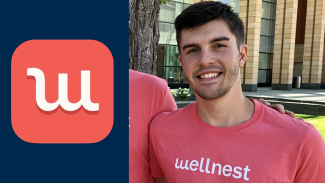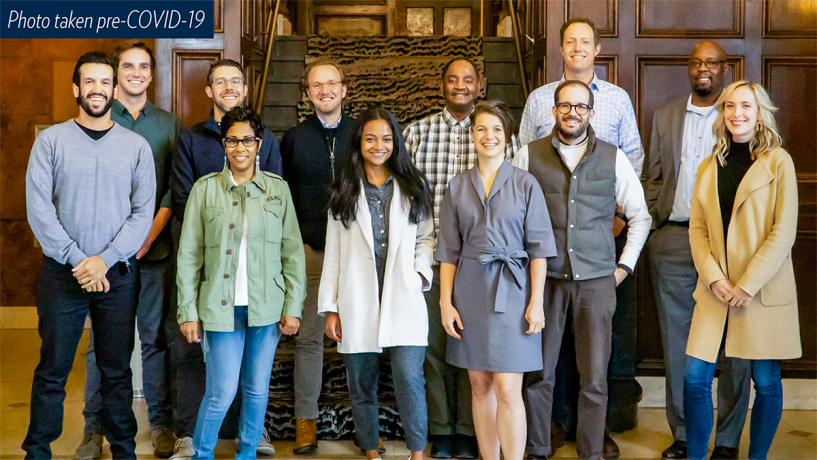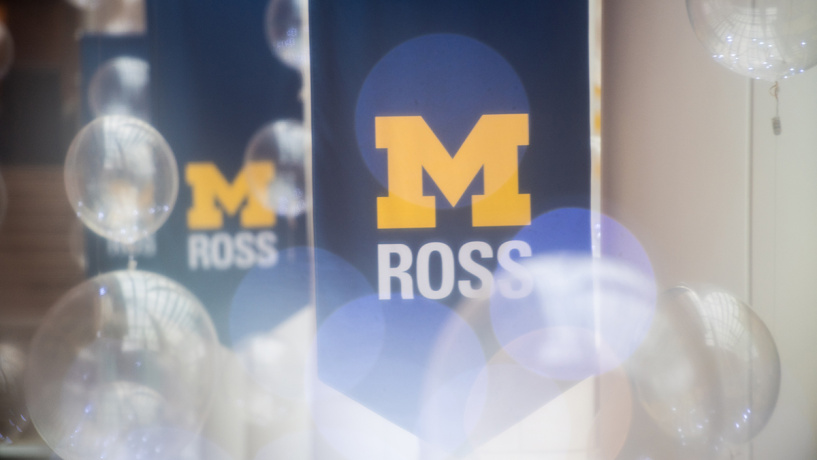Michigan Ross Alum Launches Self-Care Journaling App Aimed at College Students

After finding a lack of self-care resources available to college students, Drew Pilat, BBA ’20, launched Wellnest, a “joyful journaling app” alongside four University of Michigan graduates.
The philosophy on which Pilat and his co-founders built the Wellnest app is simple: Self-care should be fun. With mental health and wellness a top concern due to the pandemic, the app is providing a needed resource to college students who may be unfamiliar with self-care practices.
“Mindfulness, journaling, meditation – most people assume these forms of self-care are tedious, boring, or not worth the effort,” said Pilat. “Our vision is a world where people take care of mental health as they do physical health, and making self-care fun is how we make that vision a reality.”
Pilat met his two of his co-founders – Tommy Searle, BCS ’20, and Jack Kornet, BFA ’20 – during his first year at U-M, when they joined the same fraternity. They began pursuing Wellnest as a business venture in their junior year. The other founder, fellow U-M student Mars Hovasse, BA ’20, joined the team in 2019 after meeting Searle during a summer internship at LinkedIn.
They saw a great opportunity for Wellnest in the marketplace because similar apps were outdated, assessment-based, and not user-friendly.
“The options available to students just weren’t designed for people our age. They weren’t user-friendly at all, and we knew that we could build something much better,” Pilat said.
In designing their app, the team prioritized unique and relevant content, game design, and user experience to make self-care fun and easy.
“Game design is something that the self-care and mental health space has neglected, and we’re among the first in this industry to leverage it,” explained Pilat. “Journaling is an incredibly valuable habit to people of all ages and backgrounds. The reason why most people don’t do it, however, is because it can be a difficult habit to maintain (mostly due to delayed or subtle gratification). That’s where game design comes in.”
In addition, the team outsourced certain content production to subject matter experts, thought leaders, and content creators. In-house content is vetted by an advisory board, made up of prominent clinical psychologists and therapists. The extensive Wellnest content library covers topics from imposter syndrome, productivity, modern love, resilience, and spirituality.
Wellnest is loaded with gamified features. For example, during the onboarding process, users select their “Weekly Goal” to track their progress and ensure they are reaching their goals. When users make a journal entry, they are rewarded with Wellnest Gold, which are essentially points that users use to personalize their journaling experience. Wellnest Gold can be redeemed in the shop to purchase Avatars, furthering the journaling experience.
Putting Ross learnings into action
Pilat credited many of his Ross learnings to helping launch Wellnest.
The Ross curriculum was great because it introduced me to all types of business areas so I never feel completely lost, while the more specialized classes I took like venture capital finance and marketing analytics have been extremely helpful to look back on
In particular, he shared that his senior capstone course, a signature learning experience that embodies Ross’ action-based learning, was helpful in launching Wellnest.
“I took Business Law 404: Entrepreneurial Law with Professor of Business Law Cindy Schipani as my senior capstone, and it was one of the most useful classes I took at U-M. If you’re running a business or you want to in the future, you should look into BL 404”.
Pilat added that he used many of the resources that Kresge Library offers, including industry reports and databases.
“The Ross BA 200 Research Guide resources (e.g. Statista, IBIS) were very helpful for market and consumer research,” he said.
Early market success
Wellnest officially launched in December 2020. Before launching, the company established a partnership with Boston University. When the partnership began, Wellnest was still in beta testing. The goal of the partnership was to onboard as many BU students as possible so that they could collect feedback about the app.
“Eighty percent of users rated Wellnest as ‘excellent’ and 90% said they would recommend Wellnest to a friend. This was very validating for us, knowing that Wellnest is really helping people,” Pilat said.
Pilat revealed that Wellnest will be the first journaling app to reach the size of Headspace and Calm, and the company’s goal is to become bigger than both of these apps. The company’s future goals include looking to secure more paid partnerships with universities.







